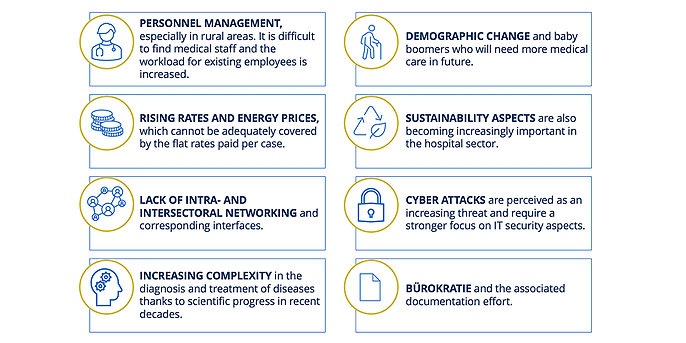2. April 2024 By Dr. Jana Tchertov
Digital transformation in hospitals - challenges and opportunities
Digital transformation, artificial intelligence, Hospital 4.0 - these are the buzzwords we hear time and time again when it comes to the future of medical care. In addition, hospitals are currently facing a number of other challenges. Securing future medical care appears to be increasingly jeopardised and is being discussed more intensively than ever in public. In this blog post, I would like to shed some light on why digitalisation should become an even greater focus in this context and what opportunities it offers.
What challenges are hospitals currently facing?

The current challenges in the hospital sector are obviously manifold. These are just a few examples of aspects that are currently the subject of intense debate.
From the point of view of medical staff, the increasing documentation workload in particular is causing considerable frustration. Forms, reports and administrative tasks take up a considerable amount of working time. I still remember well how, as a ward doctor, I spent more time on some days writing discharge reports or searching for the urgently needed fax report (!) from the GP practice than with the patients themselves. Unfortunately, this is still the daily routine in many German hospitals. This is also confirmed by the results of a nationwide member survey conducted by the Marburger Bund in 2012: according to the survey, medical staff spend an average of around three hours, or almost 40 per cent of their daily working time, on administrative tasks. Surveys of nursing staff revealed an only insignificantly lower proportion of documentation.
The pandemic has highlighted the weaknesses of the healthcare system and increased fears of a collapse of the system. Despite the high level of healthcare expenditure worldwide, most hospitals are in the red according to the Hospital Rating Report 2023 and the number of clinics at risk of insolvency continues to rise.
What role does digitalisation play? Where are the hurdles?
Hospitals are therefore currently facing a number of challenges and the situation is tense overall. Digitalisation offers great opportunities for positive changes and relief for hospitals, especially in these times. Unfortunately, progress is slow and the gap to the digitalisation of our everyday lives, which is now taken for granted, is widening. Germany is lagging far behind internationally - especially in comparison to other European countries, such as Denmark, where the first national e-health strategy was defined over 20 years ago. The Hospital Future Act of 2020 with the provision of financial resources to promote digitalisation and current central legislative initiatives are providing important impetus and are intended to counteract the investment backlog in hospitals. According to a joint survey by Bitkom and the Hartmannbund, two thirds of doctors in Germany are also calling for more speed in the digitalisation of the healthcare system in 2022. At the same time, however, many hospitals are criticising implementation, as was recently the case at the "Digital Forum Health 2024" congress in Berlin:
- "The users are not the centre of attention."
- "Bad analogue processes are being digitised and are by no means getting better as a result, because a bad process remains a bad process even when digitised."
- "We now have many small, isolated solutions that don't work together."
These are assessments that I have heard time and again from experts from the medical profession and hospital IT departments. Instead of creating the hoped-for relief for specialist staff, the subjective perception is that digitisation efforts tend to lead to additional work and are not user-friendly. There are repeated reports of acceptance problems on the part of staff, as previous routines change, new processes have to be learnt or the benefits of the changes are simply not apparent.
So how can digitalisation processes in hospitals be better designed?
- Invest in a holistic and sustainable approach instead of isolated solutions
- Process analysis and optimisation before corresponding digitalisation
- Development of a digitalisation strategy tailored to the individual hospital, including co-creative adaptation of solutions with the respective stakeholders (e.g. medical staff and nursing staff)
- Early involvement of medical staff in close dialogue with IT experts in both the planning and implementation phases, including appropriate training and strengthening of digital skills
- Transparent communication of the need for change
- Simple and user-friendly usability of digital tools with the involvement of UX/UI expertise
- Revision and regular review of IT security concepts in order to be prepared for potential cyber attacks and minimise process disruptions and downtime, including increasing awareness
Current core topics: Interoperability, platforms and cloud solutions
The availability of medical data and communication between stakeholders in the healthcare sector often reaches its limits because systems are not interoperable. Duplicate documentation in day-to-day care can also be due to internal interoperability problems.
- Interoperability platforms (see also adesso Health Stack) are therefore currently seen as a "game changer" within the often opaque IT infrastructure of hospitals. This infrastructure often consists of numerous subsystems, individual in-house developments and proprietary software from various sources.
- The overarching goal is to enable data exchange across IT systems and sectors, which is also being pursued as part of the telematics infrastructure (TI). gematik GmbH acts as the coordination centre for interoperability and works closely with the experts of the INTEROP Council.
- In order to achieve this goal, it is necessary for every hospital to harmonise the internal exchange of information across interfaces, for example via data platforms on which all of a hospital's information is brought together. These platforms also form the basis for the sensible use of artificial intelligence (AI), which is based on the availability of high-quality data.
- Cloud-based information systems offer considerable advantages in this context and can now also be used in the healthcare sector with the current draft of the Digitalisation Act.
- The standardised exchange of syntactically and semantically unambiguous medical data is crucial for further digital use. For this reason, the BMBF-funded Medical Informatics Initiative (MII) has developed a standardised electronic exchange and usage format (MII core data set in the HL7 standard FHIR) for this data - an important milestone on the way to efficient, interoperable and secure healthcare in the digital age.
The hospital 4.0 of the future and artificial intelligence (AI) - opportunities for better medicine?
AI is currently a hot topic across all industries and is also regularly analysed by our GenAI team here on the adesso blog. Given the rapid advances in AI, it is expected to fundamentally change the healthcare sector in particular. We are therefore at the beginning of a new era of medicine. The term "Hospital 4.0" is often used in this context. This is characterised by smart health - i.e. the intelligent networking of medical staff and patients using wearable devices and sensors, personalised medicine and the increased use of AI.
These developments open up numerous future applications for AI in hospitals, such as:
- Clinical decision support systems for medical staff, including emergency management systems
- AI-supported evaluation of diagnostic imaging, pathological and dermatological findings through pattern and anomaly recognition
- Personalised medicine, for example using digital twins and genetic data
- Automated merging of information to generate discharge letters using generative AI/natural language processing
- AI-supported surgical robots to improve the precision of complex interventions
- Predictive analyses and risk assessment of diseases (e.g. for post-inpatient further treatment, post-operative management or early detection of the risk of delirium)
- Use of AI for administrative tasks and resource management: coding, controlling, logistics, personnel/service planning, surgery planning, forecasting patient flows and bed planning, optimisation of hospital processes
- Use of predictive maintenance in medical technology to predict maintenance requirements and minimise downtime
The actual integration of AI in hospitals is still in its infancy. Although numerous AI start-ups are entering the healthcare market, many providers still lack randomised controlled studies. Nevertheless, AI is already proving to be more efficient than humans in some medical areas. It is becoming increasingly complex to keep track of the range and possible applications.
The critical evaluation of the quality, benefits and limitations of the possible applications of AI in patient care will be of great importance in the future. In the healthcare context, many AI applications are medical devices that must first be categorised and tested according to their risk class. The practicable integration of AI applications into existing processes and IT infrastructures represents a major challenge. Both legal and ethical/moral aspects must be taken into account. The "AI Act" recently passed by the European Parliament represents an initial legal framework for the regulation of AI in Europe.
Despite the complexity of the challenges, the opportunities of the future use of AI in medicine outweigh the risks. Routine work could be eliminated and therapies optimised. However, AI should by no means replace humans. Rather, AI should be seen as a tool that doctors can use responsibly to promote evidence-based and efficient care. The job description of a doctor will change accordingly and require new skills. Thanks to AI, doctors will be able to focus more on individualised care and give their patients more time and empathy again. In this way, humanity in medical care can even be supported by technology.
What are the opportunities of digitalisation in hospitals in general?
As big as the hurdles of digitalisation are, they can be overcome with the right approach and an interdisciplinary team of specialist and technology experts. The Hospital Report 2023 sees a number of opportunities for the healthcare sector:
- Process optimisation, for example through process standardisation
- Increased efficiency through adequate resource management, but also cost savings, for example through optimised use of IT systems with reduced licensing and maintenance costs
- Compensation for the prospect of an increasing shortage of skilled labour
- Improving the quality of care, in particular through the use of AI and reducing the documentation workload for staff
- Increasing medical safety by reducing misdiagnoses, multiple treatments and drug interactions
- Improved communication options via patient portals, admission apps, the use of chatbots, TI messengers and telemedical connections to structurally weak regions
- Positive impact on the image of hospitals from the perspective of both employees and patients
- Future attractiveness of the medical profession through significant relief and improved working conditions through teleworking and changes to duty rosters
The main goal should be to contribute to the well-being of patients and to be able to offer them the best possible care.
Conclusion
In Germany, we are only at the beginning of a comprehensive digital transformation in the healthcare sector. Particularly in these challenging times, we should see digitalisation as an opportunity - not only to improve medical care, but also to secure it in the future.
Close cooperation between hospitals, science, industry and politics is essential in order to master the digital challenges. It is crucial for hospitals to develop individual digitalisation strategies that take a holistic approach and consider the needs of patients and medical staff. Inefficient processes can be identified and improved by analysing and optimising them in detail. The use of AI offers enormous potential for increasing the quality of medical care in the future. As promising as the vision of fully digitalised healthcare is, it is still a long way from reality. There is still a lot of work ahead of us.
We look forward to supporting you on this exciting journey with our technological and professional expertise and shaping the future of healthcare together. We will be happy to assist you with many of the topics and processes mentioned in this blog post. Our services for the healthcare sector can be found on our website.
Would you like to find out more about exciting topics from the world of adesso? Then take a look at our previous blog posts.
Also interesting:
Let's connect health! - We are at the DMEA 2024
Do you want to become a digital pioneer in healthcare? We'll support you! From assessing your digital maturity level to developing and implementing customised solutions, we will accompany you from the first step to implementation in your organisation.
Whether it's TI Messenger, customised data solutions using generative AI & big data analytics or cloud solutions tailored to your needs: This is just a fraction of our services for the digital healthcare sector, which you can discuss with our experts. You can find us from 9 to 11 April at our stand E-102a in hall 3.2.

